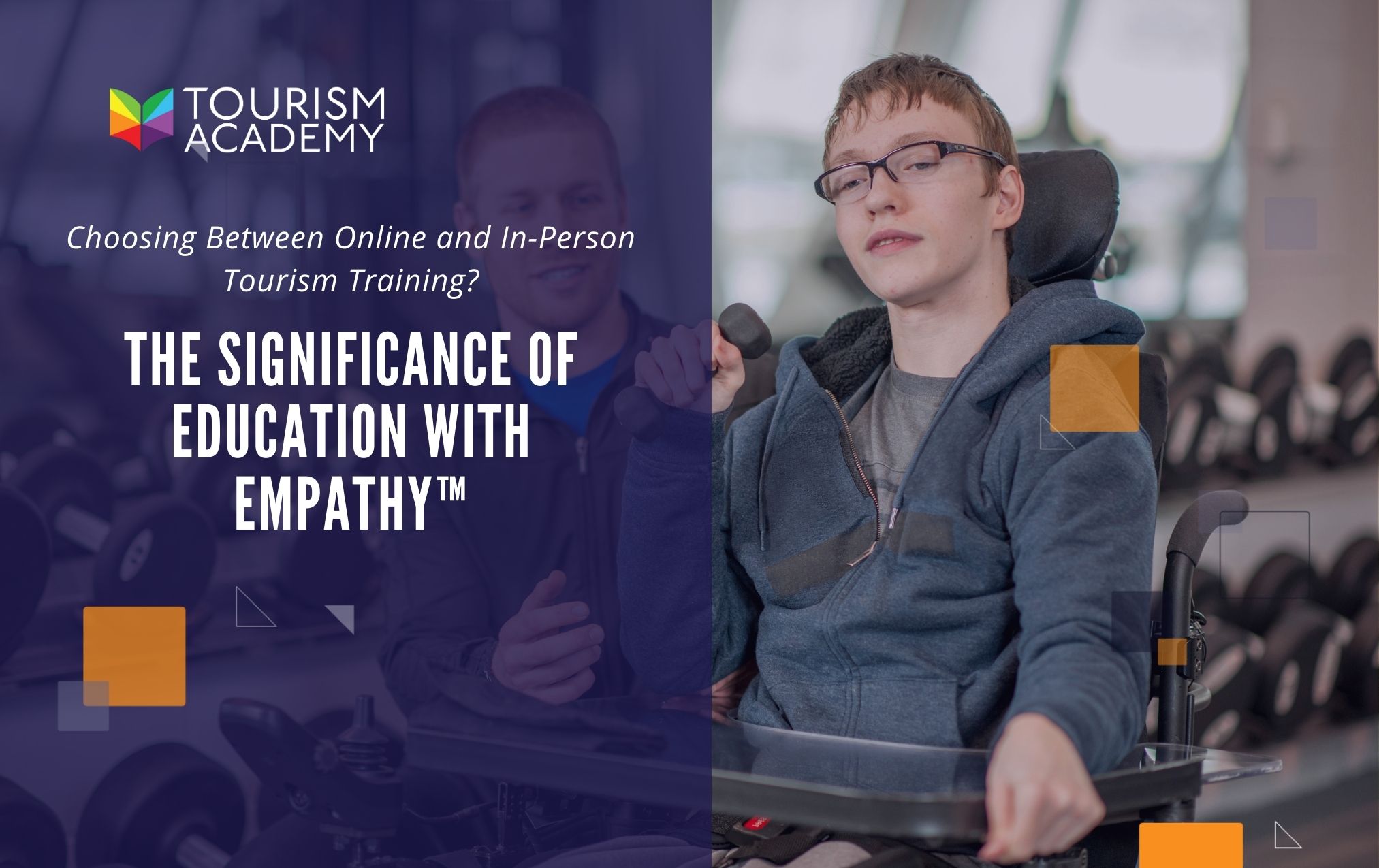
The Significance of Education with Empathy™ in Choosing Between Online and In-Person Tourism Training
In the dynamic landscape of the tourism industry, where frontline workers, travel agents, operators, and community members play pivotal roles, the method of education delivery is critical. Whether to opt for online platforms or traditional in-person training sessions is a decision that demands careful consideration, not just for the sake of convenience but also for fostering an environment of empathy-driven learning. In this article, we explore why Education With Empathy™ is paramount and how it influences the choice between online and in-person tourism training.
Transformations: Delivering Desired Outcomes
Online programs have the potential to deliver more long-lasting and impactful transformations for participants and tourism ambassadors by providing continuous support and resources beyond the confines of traditional classroom settings. Through asynchronous learning modules, participants have the flexibility to revisit critical concepts, engage in self-paced study, and apply newfound knowledge in real-world scenarios. Moreover, online platforms facilitate ongoing communication and collaboration among learners, mentors, and industry experts, fostering a vibrant community of practice where ideas are exchanged, challenges are addressed, and best practices are shared. By harnessing the power of technology and connectivity, online programs empower participants to cultivate lifelong learning habits, adapt to changing industry trends, and become proactive advocates for sustainable tourism practices, thus driving positive change on a global scale.
Accessibility: The Foundation of Inclusive Learning
Accessibility lies at the heart of education. Online platforms offer unparalleled accessibility, breaking down barriers imposed by learning styles, ability levels, schedules, and transportation constraints. By embracing online training, we open doors to a diverse array of learners, accommodating their unique needs and circumstances. Advanced learning experience platforms remove language barriers by offering content in the student's native tongue. From visual learners to those with physical disabilities, everyone can participate and thrive in a digital learning environment, ensuring that knowledge reaches far and wide without exclusion. Read more about accommodating learner needs (and abilities)
Engagement: Empowering Learners on Their Journey
Effective learning hinges on engagement and well-designed online courses excel in making users central to their learning journey. Interactive modules, multimedia resources, and real-life scenarios captivate learners, fostering more profound understanding and retention. By immersing participants in dynamic virtual experiences, online training transcends the limitations of traditional classroom settings, empowering learners to explore, experiment, and excel at their own pace. Through personalized feedback mechanisms and peer collaboration tools, online platforms create a supportive ecosystem where empathy thrives, nurturing a culture of continuous improvement and mutual respect. Read how Online Learning Boosts Engagement
Distribution and Marketing: Amplifying Impact Through Innovation
In the digital age, distribution and marketing opportunities abound, and online training opens doors to a world of possibilities. Through affiliate programs, learning tracks, and targeted advertising campaigns, organizations can amplify their reach and impact, connecting with learners on a global scale. By leveraging the power of social media, search engine optimization, and email marketing, online courses gain visibility and relevance, attracting diverse audiences and fostering community engagement. Moreover, data analytics and user insights empower educators to refine their content and delivery methods, ensuring maximum efficacy and relevance in a rapidly evolving industry landscape. Read about the Affiliate Marketing feature
Analytics: Accurately Measure Results and Make Smart Improvements
Well-designed online courses offer more meaningful and actionable analytics and reporting capabilities, providing valuable insights into participant engagement, progress, and areas for improvement. Through advanced learning management systems (LMS) and data analytics tools, educators can track learner activity in real time, monitoring factors such as time spent on each module, quiz performance, and interaction with course materials. This granular level of analysis enables instructors to identify patterns, assess the effectiveness of instructional content, and tailor future coursework to meet the evolving needs of participants. Additionally, robust reporting features allow stakeholders to measure the impact of online training initiatives, demonstrate return on investment, and make data-driven decisions to optimize learning outcomes. By leveraging analytics and reporting capabilities, online courses empower educators to continuously refine their teaching strategies, enhance learner engagement, and deliver a personalized learning experience that resonates with tourism ambassadors long after they complete the program.
Empathy as the Cornerstone of Effective Education
At the heart of the debate between online and in-person training lies the essence of empathy – the ability to understand and share the feelings of others. While traditional classroom settings offer valuable opportunities for interpersonal connection and hands-on experiences, online platforms embody the spirit of empathy-driven learning, transcending physical boundaries and fostering inclusivity, engagement, and innovation. By prioritizing "Education with Empathy," we empower learners to not only acquire knowledge but also to cultivate compassion, resilience, and a global mindset, laying the foundation for a brighter future in the ever-evolving realm of tourism.
In conclusion, the choice between online and in-person tourism training is not merely a matter of logistics but a reflection of our commitment to fostering empathy, inclusivity, and innovation in education. While both modalities offer unique benefits and challenges, it is our collective responsibility to prioritize "Education with Empathy," ensuring that every learner has the opportunity to thrive and contribute to the sustainable growth of the tourism industry.


Leave a comment